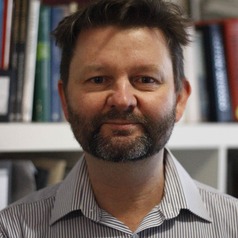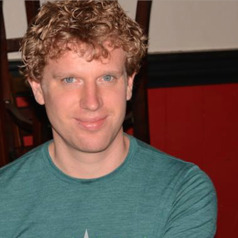
Erica Jansen
Assistant Professor of Nutritional Sciences, University of Michigan
Dr. Jansen is a nutritional epidemiologist who focuses on diet and sleep in relation to health along the lifespan, but particularly during adolescence. She has several lines of research, including the examination of: 1) how early nutritional environments affect childhood obesity and timing of puberty; 2) how various aspects of sleep- including duration, timing, and quality- affect development of cardiometabolic risk; 3) the bidirectional associations between sleep and diet; 4) role of toxicants in sleep and cardiometabolic outcomes; and 5) epigenetic markers or mediators that underlie relationships between sleep and cardiometabolic health. Dr. Jansen conducts her research mostly within the ELEMENT cohort, a Mexican birth cohort that has been followed for over 25 years.
Less ![]()

Erica Neuman
Assistant Professor of Accounting, University of Dayton
Erica Neuman, PhD, CPA is an Assistant Professor of Accounting at the University of Dayton where she teaches advanced financial accounting and tax to both undergraduate and graduate students. Her research examines tax compliance and the use of technology by taxing authorities. She has presented her research at international conferences including the American Taxation Association Midyear Meeting and the National Tax Association's Annual Conference on Taxation. Her published research includes 'Big Data Analytics in IRS Audit Procedures and its Effects on Tax Compliance: A Moderated Mediation Analysis' published in the Journal of the American Taxation Association.
Less ![]()

Erica Jacqueline Licht
Research Project Director, Institutional Antiracism and Accountability Project (IARA), Harvard Kennedy School
Erica Licht has been engaged in racial equity and organizational change research and training for over 15 years. She is currently Research Projects Director at the Institutional Antiracism and Accountability Project (IARA) at Harvard University where she leads and co-designs IARA’s projects and partnerships. Erica is a Fulbright Scholar, and holds a Masters in Public Administration from the Harvard Kennedy School and a Masters in Justice Policy from the London School of Economics where she was a Maguire Fellow.
Prior to IARA, Erica served as Assistant Director at the Center on Culture, Race, and Equity at Bank Street College in New York City, and as a Fellow with Race Forward and the Government Alliance for Racial Equity. Her career has focused on collaborative community and institutional change programs globally, including consulting with the Center for Creative Leadership in Addis Ababa, Ethiopia, the Lemann Foundation in Sao Paulo, Brazil, and Lagos State University and Alternatives to Violence International in Lagos, Nigeria.
Erica is an expert facilitator, and has taught course work on justice reform at the University of the West Indies, Mona, and on adaptive leadership at the Harvard Kennedy School. Her writing has appeared in The Boston Globe, CNN and Learning for Justice. She co-hosts the podcast Untying Knots and is a Fellow with the Jewish Studio Project.
Less ![]()

Erich S. Volschenk
Senior Research Associate, Murdoch University
Professionally I wear two hats: primarily as an Environmental Consultant (Short-range endemic invertebrates), and secondarily as research associate at WA Museum and Murdoch University. I am an invertebrate biologist specialising in arachnids and myriapods. I have been studying the scorpions of Australia for over 20 years and am Australia's leading scorpion taxonomist. I also work on pdeudoscorpions when time permits. For the last 10 years, I've also been researching the diversity of soil centipedes (geophilomorpha) and cryptic centipedes (Cryptopidae). In addition to systematic research, I do adhoc research on terrestrial salt lake invertebrates. Most of my research is oriented around systematics and I use both molecular and morphological data to infer phylogenies.
Less ![]()


Ericka Johnson
Professor of gender and society, Linköping University
I am a feminist technoscience researcher leading interdisciplinary projects on AI. My previous work has focused on the entanglement of bodies and medical technologies, most recently on the medicalized, aging prostate as a discursive node. I am also co-director of the Wallenberg AI, Autonomous Systems and Software Program – Humanity and Society (WASP-HS), where I lead the National Graduate School.
Less ![]()

Érico Bomfim
Professor de Estruturação Musical, Universidade Federal de Mato Grosso (UFMT)
Bacharel em piano, mestre e doutor em análise musical pela UFRJ (Universidade Federal do Rio de Janeiro). Professor de estruturação musical da UFMT (Universidade Federal de Mato Grosso).
Less ![]()

Erik Eklund
Professor of History, Federation University Australia
Erik usually works at the Gippsland Campus of Federation University Australia as a Professor of History. He is currently the Keith Cameron Professor of Australian History at University College Dublin, covering the period 2015 and 2016.
His expertise covers Australian history especially regional, labour, social and environmental histories. He is also interested in heritage studies, mining in local and global contexts, social policy history, and community engagement.
He is a former Treasurer of the Australian Historical Association (2008 to 2012), and a member of the editorial boards for the journals, 'Labour History' and 'History Australia'. His previous monograph publications include 'Steel Town: the making and breaking of Port Kembla' (MUP, 2002) and 'Mining Towns: making a living, making a life' (UNSW Press, 2012).
Less ![]()

Erik Guzik
Assistant Clinical Professor of Management, University of Montana
Erik holds a Ph.D. in Economics from the University of Massachusetts, Amherst, with research interests in entrepreneurship, the economic microfoundations of creativity, and the underlying conditions supporting regional and national innovation. He previously taught within the Gabelli School of Business at Roger Williams University and as Associate Professor at the University of Science and Arts of Oklahoma (USAO) and the University of Montana Western. He also served as Director of the Interdisciplinary Studies Program at USAO, and since 2016, has launched and led PatientOne, a national health-tech startup.
Less ![]()



Erik Meinema
Assistant Professor of Religion and Heritage, Utrecht University
Erik Meinema is an assistant professor of religion and heritage in the department of Philosophy and Religious Studies. His research focuses on religious diversity, youth culture, and political secularism in East Africa. He is a member of the research group Religious Matters in an Entangled World, led by Birgit Meyer. He received a Research Talent Grant from the Dutch Research Council (NWO) to conduct his PhD research on the regulation of religious coexistence in coastal Kenya, in which he studied Christianity, Islam and indigenous African religious traditions within one conceptual framework. His PhD thesis received the biennial Gerardus van der Leeuw PhD Dissertation Award from the Dutch Association for the Study of Religion in 2023. He has published peer-reviewed articles in journals such as Religion, Africa, the Journal of Religion in Africa, and the Journal of Eastern African Studies. He is also interested in questions about materiality, religion and (violent) conflict and has recently published an edited volume on this topic with Brill together with Lucien van Liere. Together with Lucien, he also currently works on a project on The Meaning of Weapons.
Less ![]()

Erik Melen
Professor of Paediatrics, Karolinska Institutet
My research projects aim to advance the understanding about the complex interplay between genetic and environmental factors involved in lung growth, respiratory and allergic diseases in children. The projects are primarily based on a Swedish birth cohort, BAMSE that allows for unique investigation of lung function, respiratory and allergic diseases in a large number of children up to adulthood. Detailed information about perinatal events, environmental exposures such as air pollution and tobacco smoke exposure from birth and onwards has been collected. Currently, we are also performing a targeted COVID-19 follow-up of the cohort.
In our ongoing genetics projects, genome-wide approaches are primarily used (GWAS, global methylation analyses and RNA sequencing / microarray approaches) together with detailed clinical and epidemiological data. Extensive national and international collaboration is established (e.g. through the PERMEABLE, GABRIEL, EAGLE and MeDALL projects). We are also engaged in exposome-related research within the EXPANSE consortium. From this translational platform for advanced studies using clinical and epidemiological data sets, we are performing projects that will generate exciting new information in areas that have been little explored so far. For example, the long-term consequence of preterm birth and childhood exposures on lung function in young adulthood (CADSET ERS collaboration); identification of subgroups of the population that are particularly vulnerable to air pollution exposures; clarification of new genetic mechanisms for disease development.
Less ![]()

Erik Olstad
Health Sciences Assistant Professor of Clinical Veterinary Medicine, University of California, Davis
Erik's research focus is in small animal primary care.
Less ![]()

Erik Peterson
Assistant Professor of American Politics, Rice University
Erik Peterson is an Assistant Professor at Rice University who specializes in American Politics and Political Communication. His current research focuses on the political consequences of the decline of local media outlets in the United States and the growth of online news consumption. In other work he considers the use and interpretation of research methods, such as experiments, to study these topics. His research has appeared in the American Political Science Review, the American Journal of Political Science and the Journal of Politics, as well as other academic journals.
Less ![]()


Erik Zhivkoplias
Researcher in Marine Governance, Stockholm University
Having studied international law and bioinformatics, Erik Zhivkoplias is an interdisciplinary researcher at the Stockholm Resilience Centre. His research focuses on ocean governance and explores how and why marine genetics is important for the functioning of socio-ecological systems.
Prior to joining the SRC, Zhivkoplias worked at the National Institute of Allergy and Infectious Diseases, studying the molecular evolution of viruses, and at the Science for Life Laboratory, modeling gene regulatory networks based on motif composition.
Less ![]()

Erik Christian Olstad
Health Sciences Assistant Professor of Clinical Veterinary Medicine, University of California, Davis
Erik's research focus is in small animal primary care.
Less ![]()

Erik S. Herron
Professor of Political Science, West Virginia University
Erik Herron is the Eberly Family Distinguished Professor of Political Science at West Virginia University. He has published extensively about politics in Eastern Europe and Eurasia, including the recent book Normalizing Corruption: Failures of Accountability in Ukraine (University of Michigan Press, 2020).
Less ![]()

Erik W. Kolstad
Research professor, Uni Research
I'm a climate researcher at NORCE and the Bjerknes Centre for Climate Research, and an adjunct researcher at the Chr. Michelsen Institute (CMI) Norway, in Bergen, Norway. My main research interests are climate impacts, climate prediction, and climate dynamics.
Less ![]()

Erika Darics
University oDr Darics is an applied linguist interested in the role of language in professional and business contexts, in particular online. In her work she explores how language constitutes social reality, and how to best educate the world about this important knowledge.
She conducts empirical linguistic-discourse analytical research, theorises and educates about language awareness and discourse consciousness. She is an experienced and passionate researcher-educator with a sense of responsibility to nurture a future generation of critical text consumers who are also ethical, responsible and empowered communicators.
Less ![]()


Erika Jiménez
Leverhulme Early Career Fellow at the School of Law, Queen's University Belfast
Erika Jiménez is a Leverhulme Early Career Fellow at the School of Law, Queen's University Belfast on a project entitled: Golani youth, human rights and the forgotten occupation.
She is currently writing her first book on Palestinian youth’s views and experiences of human rights in the occupied West Bank as part of the Human Rights Law in Perspective (Hart) series.
She has worked on other projects including a study that explored the experiences of education among minority ethnic and migrant groups in Northern Ireland. Before that she worked as a Research Fellow at the Rights Lab, University of Nottingham in the area of modern slavery research.
Erika is committed to conducting research that amplifies voices and ‘ways of knowing’ that are often side-lined in society and academia. She is also interested in decolonial approaches to human rights, childhood, and research. This has led her to conduct research alongside research advisory groups made up of minoritised populations such as Palestinian youth, refugees and survivors of modern slavery.
Less ![]()

Erika Nyhus
Associate Professor of Psychology and Neuroscience, Bowdoin College
Erika Nyhus is an Associate Professor in the Department of Psychology and Program in Neuroscience at Bowdoin College. Her research program focuses on human executive function and memory using behavioral and EEG methods. Specifically, she is interested in how neural oscillations provide a mechanism for interaction among brain regions during memory retrieval and how we can change oscillatory activity to improve memory through non-invasive brain stimulation and mindfulness meditation.
Less ![]()

Erika Penney
Lecturer in Clinical Psychology, University of Technology Sydney
Dr Erika Penney is an Education-Focused lecturer, clinical psychologist, and external placement coordinator with the master of clinical psychology program in the Graduate School of Health. She is the Responsible Academic Officer (RAO) for Teaching & Learning within Clinical Psychology.
She has a national reputation as a leader in e-MH education, and is sought after for Personality Disorder, Complex Trauma, and Stigma teaching expertise. She has particular clinical interests in e-mental health, complex trauma, and personality disorders, as well as mental health stigma and improving patient outcomes with trauma-informed care. Prior to her work at UTS, she worked in private and public health hospitals and clinics and brings industry experience to her teaching. More recently, Erika's clinical and empirical interests have included the areas of inter-professional learning, as well as adaptations of therapies to telepsychology formats. She is one of the co-founders of the Australian Telepsychology Collaboration, a group that has designed high quality trainings for university training clinics and the Australian Psychological Society on integrating telepsychology effectively and safely. Erika acknowledges the Gadigal People of the Eora Nation as the traditional custodians of knowledge and of the land on which our city campus stands and is an ally of First Nations people. She is an official UTS LGBTQIA+ Ally.
* Registered psychologist with endorsement in clinical psychology from the Australian Health Practitioners Regulation Agency (AHPRA).
* Psychology Board of Australia (PsyBA) approved supervisor for higher degree pathways and the clinical psychology endorsement registrar program.
* Member of the Australian Clinical Psychology Association (ACPA).
* Member of the Australian Psychological Society (APS).
* A co-founder of the Australian Telepsychology Collaboration (ATC).
* Chair (Clinical Division) for the NSW-ACT Psychology Placement Consortium (NAPC).
* Collaborator in the Australian Psychology Placement Alliance (APPA).
Less ![]()


Erika J. Pribanic-Smith
Associate Professor of Communication, University of Texas at Arlington
Erika Pribanic-Smith conducts research examining political and activist communication in nineteenth- and early twentieth-century newspapers and magazines. She is co-editor of the book "Social Justice, Activism, and Diversity in U.S. Media History" (Routledge, 2023) and co-author of "Emma Goldman’s No-Conscription League and the First Amendment" (Routledge, 2018). She has authored multiple chapters in edited volumes on topics related to press partisanship, political advocacy, and Civil War journalism. In addition to the Emma Goldman book, her work on women in the political sphere has included a book chapter on nineteenth-century editor Sarah Hale and a journal article on the Mount Vernon Ladies Association.
Dr. Pribanic-Smith is an associate professor of journalism at the University of Texas at Arlington, where she is Journalism Sequence Coordinator and Graduate Advisor in the Department of Communication. A working journalist since age 14, she earned her master’s and doctorate degrees from the University of Alabama, specializing in journalism history. She is a past president and current Executive Director of the American Journalism Historians Association (AJHA).
Less ![]()

Erika Jaráiz Gulías
Associate Professor of Political Science, Universidade de Santiago de Compostela
Less ![]()


Erin Bradshaw
Research Assistant, Monash University
Erin Bradshaw is a research assistant and ECR in journalism in the School of Media, Film and Journalism at Monash University Caulfield.
Bradshaw is the senior research assistant for the ARC funded project "The culture of implementing Freedom of Information in Australia" https://www.monash.edu/arts/media-film-journalism/the-culture-of-implementing-freedom-of-information-in-australia.
Bradshaw focuses on Journalism Studies, Journalism Ethics, and Endometriosis in Journalism
Less ![]()


Erin Cooper-Douglas
Deputy Politics + Society Editor
Erin joined The Conversation after working across radio, television and online media at ABC News for more than six years. In her time with the national broadcaster, she won Best New Journalist at the Tasmanian Media Awards for her multiplatform work, including video-journalism. She did everything from presenting live radio to sub-editing digital stories. Her work has also been published by Reuters, The New York Times and The Mercury. Erin's based in Hobart, Tasmania.
Less ![]()

Erin Cunningham
Pinangba Support Officer, Indigenous Knowledge
Erin Cunningham is a Kalkadoon woman from the Cloncurry and Mount Isa region of Western Queensland. Erin is an Enrolled Endorsed Nurse (EEN) who worked for five years on Palm Island in both hospital and community nursing roles before joining Stagpole Street Drug and Alcohol Rehabilitation Unit (SSDARU). Erin is a Support Officer at SSDARU and is the lead investigator of the government-funded Pinangba project to evaluate their model of care. Erin holds a Post Graduate Certificate in Family Therapy from the Bouverie Centre and La Trobe University.
Less ![]()

Erin Fuse Brown
Erin C. Fuse Brown, assistant professor of law, teaches Administrative Law; Health Law: Finance & Delivery; and the Health Care Transactional & Regulatory Practicum. She is a faculty member of the Center for Law, Health & Society. Her research interests are in the intersection of the business and regulation of health care delivery systems. Her recent scholarship has focused on policies affecting hospital prices for health care services and on the structural fragility of the right to health care in the Affordable Care Act.
Fuse Brown came from Arizona State University’s Sandra Day O’Connor College of Law, where she was a visiting assistant professor and visiting fellow in ethics and health policy with the Lincoln Center for Applied Ethics. Previously, she practiced in the health care group of the San Francisco office of Ropes & Gray LLP and clerked for Judge Alan C. Kay on the U.S. District Court in the District of Hawaii.
Fuse Brown received a J.D., magna cum laude, from the Georgetown University Law Center and a M.P.H. from the Johns Hopkins Bloomberg School of Public Health. While in law and public health schools, she was an associate editor of The Georgetown Law Journal, a Greenwall Fellow in Bioethics and Health Policy, and a senior researcher for The Center for Law and the Public’s Health. Fuse Brown holds a B.A, magna cum laude, from Dartmouth College in studio art.
Less ![]()

- Market Data





















